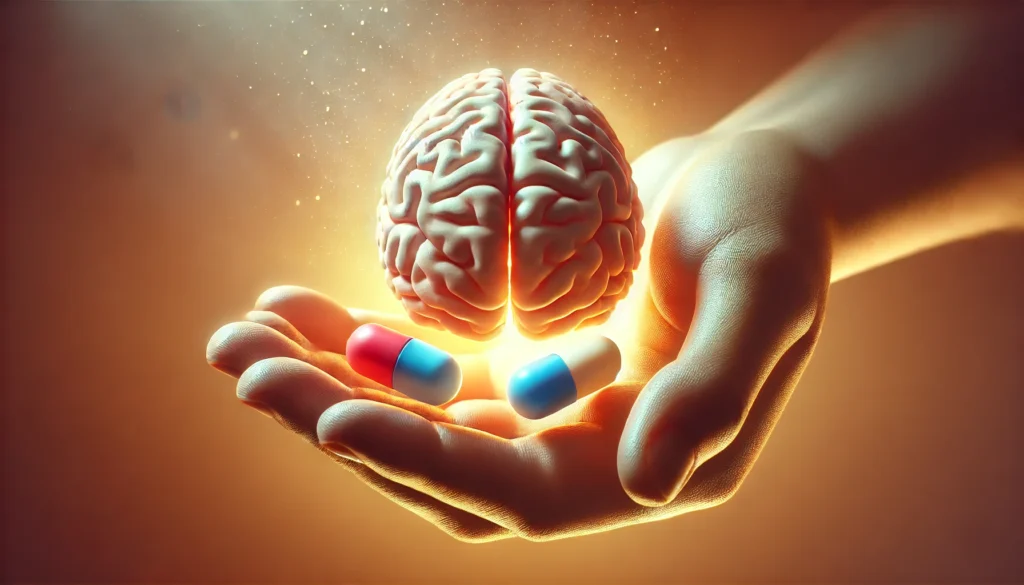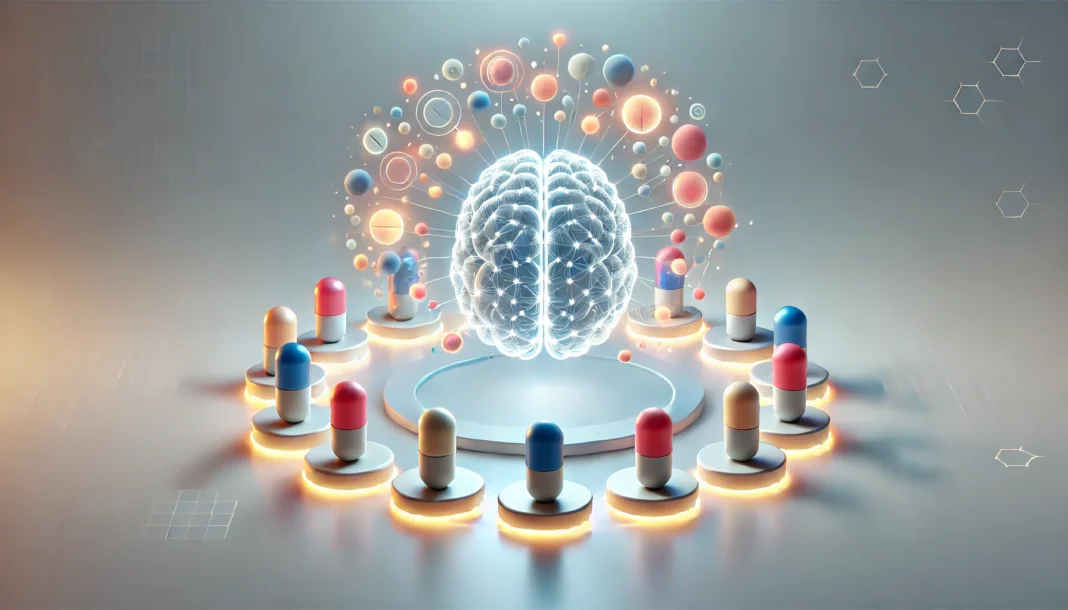The intersection of psychiatric medications is often a delicate balance between symptom relief and side effect management. One of the most intricate and commonly discussed combinations is Adderall with selective serotonin reuptake inhibitors (SSRIs). As the prevalence of attention deficit hyperactivity disorder (ADHD) and major depressive disorder (MDD) continues to rise, more individuals find themselves prescribed both stimulant medications and antidepressants. Understanding how these drugs interact, particularly through the lens of serotonin and Adderall, is essential not only for safe usage but also for optimizing mental health outcomes.
You may also like: Exploring Natural SSRI Alternatives: Herbal Remedies for Anxiety and Mood Support

The Neurochemical Roles of Adderall and SSRIs
At the neurochemical level, Adderall and SSRIs operate on distinct yet intersecting pathways. Adderall, a mixed amphetamine salt, primarily increases levels of dopamine and norepinephrine in the brain, enhancing alertness, motivation, and executive function. However, it can also have secondary effects on serotonin, especially at higher doses or in combination with other medications. This is a crucial consideration when evaluating the question: does Adderall affect serotonin? The answer is yes—though indirectly and variably depending on the individual’s metabolism and other medications in use.
SSRIs, by contrast, selectively block the reabsorption of serotonin in the brain, increasing its availability in the synaptic cleft. Common SSRIs include sertraline (Zoloft), fluoxetine (Prozac), and escitalopram (Lexapro). These medications are designed to alleviate depressive and anxiety symptoms by regulating serotonin levels, which are often dysregulated in mood disorders. When combined with Adderall, SSRIs may amplify or mitigate certain effects, necessitating careful selection and monitoring.

Understanding the Risk of Serotonin Syndrome
One of the most significant risks when combining Adderall and SSRIs is serotonin syndrome—a potentially life-threatening condition resulting from excessive serotonergic activity in the central nervous system. Symptoms can range from mild (shivering, diarrhea) to severe (muscle rigidity, fever, seizures), and can develop rapidly. Although Adderall is not primarily serotonergic, the question of whether Adderall affects serotonin becomes particularly relevant in polypharmacy contexts. Individuals taking high doses of SSRIs or multiple serotonergic agents are at greater risk, especially if Adderall is introduced without adequate medical oversight.
Clinicians must weigh the benefits of improved focus and energy against the danger of overstimulating the serotonergic system. While rare, serotonin syndrome underscores the importance of understanding how serotonin and Adderall interact, particularly in individuals with complex psychiatric histories. This also raises the ongoing clinical inquiry: what antidepressant works best with Adderall? The answer often lies in choosing options with a lower serotonergic burden or those with mechanisms of action that complement Adderall without redundant effects.

Best Practices for Combining Adderall and Antidepressants
When considering what antidepressant works best with Adderall, it is essential to look beyond brand names and examine pharmacological compatibility. Bupropion (Wellbutrin), for example, is a norepinephrine-dopamine reuptake inhibitor (NDRI) and is often favored in individuals with ADHD and depression because it enhances dopamine signaling without significantly increasing serotonin levels. This makes it a compelling alternative to SSRIs for some patients.
Another viable option is the use of tricyclic antidepressants (TCAs) such as nortriptyline or desipramine, though they are generally reserved for treatment-resistant cases due to their broader side effect profile. The key is to choose agents that do not excessively elevate serotonin, thus reducing the risk of serotonin syndrome while preserving therapeutic synergy with Adderall. Patients and providers alike must ask not only what antidepressant works best with Adderall but also what works best for a specific individual based on symptoms, medical history, and response to previous treatments.
How Adderall Alters Mood and Affects Serotonin
While most discussions around Adderall focus on dopamine and norepinephrine, it is important not to overlook the subtler ways in which Adderall may affect serotonin. Some users report mood swings, anxiety, or irritability—symptoms that may reflect changes in serotonergic tone. These effects may be more pronounced when Adderall is used in high doses or over extended periods, raising concerns about emotional stability and the potential for comorbid mood disturbances.
Research indicates that chronic stimulant use can impact serotonin transporter expression and receptor sensitivity, though these findings are nuanced and sometimes contradictory. Still, when evaluating the interaction between serotonin and Adderall, one must consider not only pharmacodynamics but also subjective and behavioral outcomes. This reinforces the importance of a holistic, patient-centered approach that considers how each element of a treatment regimen interacts with others.
Selecting SSRIs That Are Safer to Pair with Adderall
Among SSRIs, some appear to pair more safely with Adderall than others, though individual responses vary widely. Sertraline (Zoloft) and fluoxetine (Prozac) are often used cautiously in combination with stimulants due to their relatively long half-lives and well-studied pharmacological profiles. Escitalopram (Lexapro) is another SSRI commonly prescribed alongside Adderall, though it may require closer monitoring for agitation or increased anxiety in some patients.
When evaluating the best antidepressants to pair with Adderall, the goal is to strike a balance between mood stabilization and cognitive enhancement without triggering adverse events. This often involves gradual titration, close monitoring of side effects, and open communication between patient and provider. The nuances of how Adderall affects serotonin must be revisited throughout the treatment process, particularly during medication adjustments or periods of increased stress.
Personalized Medicine and Patient-Specific Factors
There is no one-size-fits-all solution when it comes to combining Adderall and SSRIs. Genetics, age, metabolism, co-existing medical conditions, and psychological history all influence how a person responds to this combination. Pharmacogenomic testing, while still evolving, may offer insights into how an individual metabolizes certain drugs and could help guide the decision of what antidepressant works best with Adderall in a personalized context.
Additionally, lifestyle factors such as diet, sleep, exercise, and substance use (including caffeine and alcohol) play a critical role in determining how well medications are tolerated. A person who maintains consistent sleep hygiene and nutrition may fare better on a combined regimen of Adderall and an SSRI than someone with erratic habits. This underscores the broader principle that medication is only one part of a comprehensive treatment plan.
Natural and Holistic Support for Mood and Focus
For individuals who are hesitant about combining Adderall with SSRIs or who experience intolerable side effects, natural alternatives and adjuncts may offer support. Adaptogenic herbs such as Rhodiola rosea and ashwagandha have been studied for their potential to enhance mental clarity and reduce stress. These botanicals may influence neurotransmitter balance and hypothalamic-pituitary-adrenal (HPA) axis regulation, offering a gentler pathway to improved mood and focus.
Other holistic interventions include omega-3 fatty acids, magnesium, and L-theanine, all of which have shown promise in supporting cognitive and emotional well-being. While these supplements are not substitutes for prescription medications, they may serve as valuable additions or temporary alternatives during medication transitions. The natural modulation of serotonin and dopamine through lifestyle and supplementation can provide a more integrative and sustainable approach for some individuals.
Frequently Asked Questions: Adderall and SSRIs – Serotonin, Interactions, and Antidepressant Pairing
1. Can Adderall affect serotonin levels, and how does that influence mood or anxiety?
Yes, Adderall does influence serotonin, although its primary action is on dopamine and norepinephrine. When people ask, “does Adderall affect serotonin,” the answer is nuanced—it doesn’t directly flood the brain with serotonin like SSRIs do, but it can amplify its signaling indirectly. This interaction can lead to elevated mood or, in some cases, increased anxiety, especially when paired with other serotonergic drugs. Understanding serotonin and Adderall together is critical because the combined impact may heighten the risk of serotonin syndrome, particularly when taken with certain antidepressants. This is why monitoring for side effects and consulting a physician about any SSRI or Adderall combination is crucial for safe and effective treatment.
2. What antidepressant works best with Adderall for individuals dealing with both ADHD and depression?
When exploring what antidepressant works best with Adderall, doctors often consider SSRIs like sertraline (Zoloft) or SNRIs like venlafaxine (Effexor). These medications are generally well-tolerated and can balance the mood-stabilizing effects while minimizing the overstimulation sometimes caused by Adderall. Since both serotonin and Adderall impact mood circuits, pairing the right SSRI with a stimulant requires individualized care. Genetic testing for medication sensitivity (pharmacogenomics) is increasingly being used to determine optimal antidepressant-stimulant pairings. While many tolerate the combination well, close observation is essential to prevent serotonin overload and ensure neither medication overshadows the other.
3. Are there risks associated with combining Adderall and SSRIs?
Combining Adderall and SSRIs can be effective, but it also carries specific risks—especially for serotonin-sensitive individuals. A primary concern is whether Adderall affects serotonin in a way that might compound SSRI effects. When these two are combined without proper dosing and monitoring, there’s a small but real risk of serotonin syndrome, a potentially serious condition. For people asking about the safety of the Adderall SSRI combination, it’s not inherently dangerous—but timing, dosage, and individual metabolism all matter. A gradual titration process is often used when introducing either medication to reduce the likelihood of adverse interaction.
4. Why is serotonin important when evaluating Adderall’s effect on mood or anxiety disorders?
Serotonin plays a critical role in regulating mood, anxiety, and impulse control. While Adderall is primarily a dopamine and norepinephrine agent, its indirect influence on serotonin cannot be ignored. Individuals with a history of anxiety or depression often ask, “does Adderall affect serotonin in a way that worsens symptoms?” The answer depends on baseline neurotransmitter balance—some experience elevated mood and focus, while others may become more irritable or anxious. Understanding serotonin and Adderall as part of a larger neurochemical ecosystem is essential for choosing complementary treatments.
5. Can Adderall intensify the side effects of SSRIs or vice versa?
Yes, the Adderall SSRI interaction can occasionally amplify side effects like insomnia, jitteriness, or emotional blunting. The reason is rooted in overlapping effects on central nervous system activity, especially in serotonin-rich regions of the brain. Patients frequently ask, “what antidepressant works best with Adderall to minimize overstimulation?” Doctors may suggest SSRIs with a calming profile, such as escitalopram, which tends to be less activating. Careful medication timing—taking Adderall in the morning and SSRIs at night—can also mitigate adverse overlap. The key lies in tailoring the combination to both neurological and lifestyle needs.
6. How do individual differences impact the serotonin and Adderall interaction?
The way serotonin and Adderall interact varies significantly between individuals due to genetics, metabolic rates, and coexisting health conditions. For some, the Adderall SSRI pairing may enhance productivity and focus without emotional side effects. Others may experience mood swings or increased anxiety because their serotonin systems are more sensitive. Those wondering, “does Adderall affect serotonin in a way I should be concerned about?” should consider doing pharmacogenetic testing, which can help identify risk factors for adverse reactions. Personalization is at the core of safely combining these medications.
7. What signs should I watch for if I’m taking an SSRI and Adderall together?
If you’re taking both an SSRI and Adderall, watch for signs of excessive serotonin activity like confusion, agitation, muscle twitching, or sweating—these could indicate serotonin syndrome. Not everyone experiences issues, but knowing how Adderall affects serotonin can help you detect early warning signs. Individuals frequently search, “does Adderall affect serotonin levels enough to cause problems?” The short answer is yes, in certain conditions or at higher doses. Communication with your prescribing provider is critical if new or unusual symptoms appear. Regular follow-ups can help fine-tune the balance of the medications.
8. Are there natural ways to support serotonin while taking Adderall?
Absolutely. While discussing serotonin and Adderall typically centers on prescription medications, lifestyle also plays a role. Diets rich in tryptophan (like turkey, eggs, and cheese), regular aerobic exercise, sunlight exposure, and proper sleep hygiene can enhance natural serotonin production. These methods won’t replace medications, but they can complement an Adderall SSRI regimen by supporting mood and focus. People asking “does Adderall affect serotonin enough to require a supplement?” may benefit from these lifestyle strategies before turning to additional pills.
9. What alternatives exist if someone doesn’t tolerate an SSRI with Adderall?
If someone doesn’t tolerate an SSRI with Adderall, non-SSRI options like bupropion (Wellbutrin), a norepinephrine-dopamine reuptake inhibitor (NDRI), may be considered. Bupropion doesn’t act on serotonin directly, which can be helpful for those sensitive to serotonin and Adderall interaction. MAOIs and tricyclic antidepressants are sometimes used in complex cases but require caution due to more serious interaction risks. When patients ask “what antidepressant works best with Adderall if SSRIs don’t help,” bupropion often tops the list. However, all medication changes should be guided by a qualified provider familiar with your history.
10. How do clinicians monitor serotonin-related effects in patients on Adderall and SSRIs?
Clinicians use a mix of subjective symptom tracking and objective behavioral observation to monitor how serotonin and Adderall interact in a given patient. Regular assessments of sleep quality, mood stability, appetite, and anxiety levels help detect imbalance. People curious about “does Adderall affect serotonin long-term?” should know that while short-term modulation is common, chronic effects are less well understood and require ongoing evaluation. Providers may also use rating scales like the PHQ-9 or GAD-7 to assess depression and anxiety symptoms while on combination therapy. The goal is always to ensure that the benefits of the Adderall SSRI combo outweigh any risks.
Conclusion: Balancing Efficacy and Safety When Combining Adderall and SSRIs
The question of how serotonin and Adderall interact is not merely academic; it has profound implications for anyone managing both ADHD and depression. While SSRIs remain among the most commonly prescribed antidepressants, their use alongside Adderall requires careful consideration of serotonin levels, individual physiology, and overall treatment goals. By asking the right questions—such as does Adderall affect serotonin, or what antidepressant works best with Adderall—patients and providers can navigate the complexities of psychopharmacology more safely and effectively.
Personalized medicine, informed by scientific evidence and patient experience, offers the best roadmap for optimizing outcomes. Whether through pharmacologic tailoring, holistic supplementation, or integrative strategies, the goal remains the same: to enhance quality of life while minimizing risk. With greater awareness and collaborative care, it is possible to harness the benefits of both Adderall and SSRIs without compromising safety.
psychostimulant antidepressant synergy, natural remedies for ADHD depression, herbal alternatives to SSRIs, bupropion vs SSRI for ADHD, brain fog and stimulants, holistic ADHD management, serotonin syndrome risk factors, combining adaptogens with Adderall, natural serotonin boosters, cognitive enhancement supplements, Rhodiola rosea for focus, ashwagandha and neurotransmitters, dopamine support supplements, HPA axis and mood, neurochemical balance strategies, managing ADHD without meds, nootropic herbs for depression, magnesium for anxiety focus, integrative psychiatry strategies, antidepressant supplement stacking
Further Reading:
Are there natural remedies for ADHD?
The information contained in this article is provided for general informational purposes only and is not intended to serve as medical, legal, or professional advice. While NewsHealthWatch strives to present accurate, up-to-date, and reliable content, no warranty or guarantee, expressed or implied, is made regarding the completeness, accuracy, or adequacy of the information provided. Readers are strongly advised to seek the guidance of a qualified healthcare provider or other relevant professionals before acting on any information contained in this article. NewsHealthWatch, its authors, editors, and contributors expressly disclaim any liability for any damages, losses, or consequences arising directly or indirectly from the use, interpretation, or reliance on any information presented herein. The views and opinions expressed in this article are those of the author(s) and do not necessarily reflect the official policies or positions of NewsHealthWatch.

